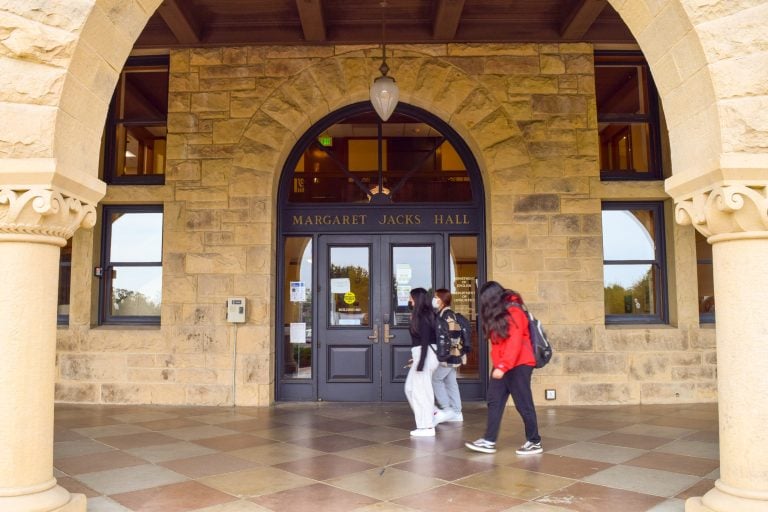A year ago, Kirsten Mettler ‘23 was exploring Stanford’s list of undergraduate journals to find a place for her voice and others alike — a publication that would publish her works in Feminist, Gender and Sexuality Studies (FGSS).
“When I didn’t find such a place, I figured it was time to make one,” Mettler said. “For far too long, the exploration of FGSS topics has been overlooked, underfunded and disparaged.” Embodied, the Stanford Undergraduate Journal of FGSS, published its first issue earlier this summer.
Founded by Mettler, who is also an executive editor for The Daily, Embodied’s first issue features 17 authors, 13 research papers and five creative writing pieces. With topics ranging from queer youth and transgender desire to sex trafficking and gender-based violence, Embodied very much “embodies” neglected yet crucial themes that society is reluctant to discuss.
After recognizing the necessity for an interdisciplinary FGSS journal, Mettler worked with her nine-person Editorial Board as well as FGSS Associate Director Maxe Crandall and John Willinsky, professor emeritus of the Graduate School of Education, to execute her mission.
“As a part of my work, I am very much involved in journals and creating free access to knowledge and research,” said Willinsky, who developed an open source publishing platform called Open Journal Systems (OJS) prior to the founding of Embodied. “This is a mission to make research free to the public and to scholars all over the world. Research should not be locked up or expensive to access.”
Through OJS, Willinsky helps numerous Stanford students like Mettler publish journals online, just as professional academics and scholars would. About a dozen Stanford undergraduate journals and about 32,000 professional scholarly journals exist on OJS, Willinsky says.
“In a sense, we just gave [the Embodied staff] a set of keys through the publishing platform, and then they ran with it,” Willinsky said.
Mettler, a strong advocate for FGSS voices, and Willinsky, a firm believer of free expression and accessible information, found common ground to collaborate for the creation of Embodied.
“[Mettler is] giving students a voice. They constantly write papers for professors every quarter, but those papers don’t go anywhere unless they submit them to be published,” Willinsky said. “[Mettler] is helping [a] really important theme for students to have their voices heard.”
One of the many contributors of the first June Embodied issue is Isabella Saracco ‘23, who published a paper she had written for one of her history classes last fall. Saracco submitted her work, titled “Queen Njinga of Ndongo and Performances of Power,” after getting recommended to do so by a friend.
“She mentioned that it might be something I was interested in because she knew that I was interested in this topic,” Saracco said. “I’m a history major, and I focus specifically on gender history.”
The process was relatively simple, according to Saracco. After creating a page, uploading her work onto the website, entering her name, and fixing her paper to fit certain guidelines, she was all set.
Embodied reviews all submissions carefully and blindly through a thorough process of reviewing, discussing, revising and copy-editing. Along with specific policies to avoid conflicts of interest, the journal also has an appeals process as well as mandatory anti-bias training for all Editorial Board members.
Saracco is considering submitting other papers to Embodied in the future, pleasantly surprised and satisfied with her first experience working with the staff.
“I was very excited when I heard that my paper got published — it was so fun to go on the website and see my name and paper up there,” Saracco said. “I think it’s super cool that Embodied is focusing on one group of marginalized voices, specifically surrounding gender. Being able to highlight that aspect of scholarship is very important.”
Embodied has been met with an incredibly positive response, with both faculty members and students reaching out with encouraging messages, according to Mettler.
“Seeing our first issue come to fruition gives me hope,” Mettler said. “FGSS topics have been chronically overlooked and disregarded, but Embodied shows that there are young writers and thinkers ready to tackle these issues, who understand that doing so is a critical endeavor.”
After receiving several submissions from young writers and academics — a clear demonstration of the need and demand for an FGSS-focused space — the Embodied Editorial Board looks forward to the journal’s second year in publication. Some potential improvements include streamlining the review process, releasing more issues, conducting outreach for a wider diversity of submissions and growing campus engagement through activities, such as in-person showcases.
Though the upcoming fall quarter has not yet begun, Embodied remains active, currently recruiting Editorial Board members as well as accepting rolling submissions.
“As you know, there’s controversy and backlash against feminist thinking and sexuality studies. These are very, very important topics,” Willinsky said. “Kirsten’s courage, strong fiber and leadership sensibility is what distinguishes this journal from others.”
